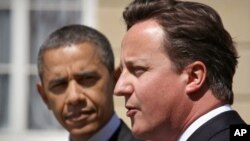U.S. President Barack Obama and British Prime Minister David Cameron are sounding a harmonious tone on their approach to protecting Libyan civilians from attacks by Moammar Gadhafi's government forces.
At a news conference outside the British prime minister's residence, President Obama and his British counterpart said there would be no letup in efforts to oust the Libyan leader.
Obama said the NATO military action in Libya has made progress, and pressure on Gadhafi to step down will continue.
“Well, first of all, I do think that we have made enormous progress in Libya. We have saved lives as a consequence of our concerted actions,” Obama said.
The president did not say he would commit any more U.S. military resources to the effort, even though France and some other NATO allies are calling for that.
Prime Minister Cameron said he and Obama agree that the allies should continue turning up the heat on Libya.
“Then this is a once-in-a-generation moment to grab hold of. It is not a time for us to shrink back and think about our own issues and interests. This is our issue, and this is massively in our interests,” Cameron said.
Both leaders agreed that the United Nations mandate that authorized the military action in Libya does not call for regime change, but the president agreed with the prime minister that Gadhafi must go.
“It is going to be difficult to meet the U.N. mandate of security for the Libyan people so long as Gadhafi and his regime are still attacking them,” said Obama.
Obama and Cameron both ruled out sending ground troops to Libya. They agreed that ridding Libya of Moammar Gadhafi will be a slow, steady process, and the British leader advised patience and persistence.
The president said there is no secret, super-effective option for using air power to force the Libyan leader out.
Cameron said he supports Obama's call to restart the Middle East peace process, including his controversial call for Israel to return to its 1967 boundaries, with mutually agreed-to land swaps.
“Again, I congratulated the president on his recent speech on the Middle East, which was bold, it was visionary, and it set out what is needed in the clearest possible terms -- an end to terror against Israelis and the restoration of dignity to the Palestinians,” said Cameron.
The president said achieving progress toward Middle East peace will require what he called “wrenching compromise” by both sides. And he said the talks need to resume.
“What I am absolutely certain of is that if they are not talking, we are not going to make any progress. And neither the Israeli people nor the Palestinian people will be well served,” stated Obama.
Obama came out strongly against the Palestinians' plan to pursue statehood through a U.N. Resolution. Cameron again said his government would take a wait-and-see approach to the issue.
The president and the prime minister showed some difference on their methods of fighting government debt. Cameron said they might take different paths but hope to end up in the same place. His government has instituted massive budget cuts, in hopes of regaining financial health.
On the state of the relationship between the U.S. and Britain, Obama said it is “the strongest it has ever been.” Some observers have questioned the health of the so-called “special relationship,” but both leaders, as well as Britain's Queen Elizabeth, have gone out of their way to say it is not only special, but essential.
Obama, Cameron Claim Agreement on Libya




